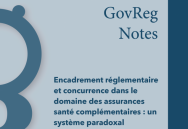
| Author(s) |
Eric BROUSSEAU Joëlle TOLEDANO Alexandre Volle Josette Guéniau |
| Publication type | GovReg Note |
This note analyses the institutional framework and competition between players in the sector of what is commonly referred to as "mutual health insurance", a misleading term if ever there was one, since the players in supplementary health insurance (AMC) are far from being systematically mutual operators. Although "mutuals" have historically been involved in covering health risks, they are not the only ones. Other players, in particular provident institutions (IP), have also historically been involved in this sector, as health risk is linked to other risks (loss of earnings, disability, death). In the more recent past, insurance companies have also taken an interest in this sector.
The economics of the AMC sector, the quality of the service provided to users and the community, and the competition between different players, cannot therefore be analysed without understanding the historical roots of a system in which players with different rationales - and regulatory constraints - coexist. These rationales partly conflict with each other, and the current system is the result of successive compromises.
This note therefore opens with a historical review of the emergence of the health insurance system in France and its development, particularly over the last 20 years. It then goes on to explain the extremely fragmented structure of the market, and analyses the effects of public policies and competitive strategies in these different markets on the characteristics of healthcare expenditure cover for users, as well as on the dynamics of healthcare expenditure.
Finally, it shows that these trends can only be analysed in the context of a more general reflection on the supply of healthcare and the control of healthcare expenditure, in which private operators could undoubtedly be better involved.

























